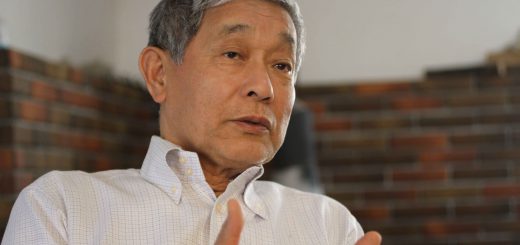Anti-Nuke Who’s Who: Yuko Yatabe – an activist with mother’s eyes Nuke Info Tokyo No. 87
Yuko Yatabe: An activist with mother’s eyes
I first met Yatabe in Aug. 2000 at a lecture sponsored by the Japanese Chernobyl Foundation. She spoke from the perspective of a local resident and a mother, regretting that she couldn’t protect her daughter from getting soaked in the rain when she returned home from school on the day of the JCO criticality accident. She stressed that the newly developed nuclear disaster response programs do not alleviate her regrets and concerns ‘ the source of her activism. Her sensitive and honest speech appealed directly to the hearts of the audience that day.
Twelve years ago, Yatabe, her husband, and their two young children moved to Naka Town, next to Tokai Village. Her house is situated about 2km from the JCO plant. She recalls that she was indifferent to nuclear energy and never even considered the fact that she was living near Tokai village.
After the JCO accident, desperately wanting to do something, she organized a screening of a movie about the Chernobyl accident, ‘Village of Naja,’ directed by Seiichi Motohashi. Arranging this screening was quite a task as everything was new to her, but about 610 people came to the event, and she recalls being moved by a strong power she felt ‘ perhaps the power of peoples’ good will. After the screening, Yatabe and nine others who organized the screening formed a group, the ‘Circle of Naja’. Naja, which means hope, was the main character’s name in the movie. She enjoys the activities of the group, building friendship with concerned locals, talking with them, and learning from them. The feeling that she is moving forward keeps her going. However, she is also aware that there are many who cannot act as they want, restricted by Japanese traditions governing regional and familial loyalty.
Around Nov. 2000, a plan to have the International Thermonuclear Experimental Reactor (ITER) sited in Naka Town began to be promoted in earnest. Yatabe, who lives 1km away from the ITER candidate site, attended the promoters’ explanatory meeting, wishing to learn about the ITER. The explanation there was that ‘the ITER will contribute to the town’s development and to scientific progress in the world. Japan will gain global status by hosting this plant.’ She became ever more concerned about the project as the promoters only spoke about the positive aspects of the plan at this meeting. So she decided to set up a study group on the ITER.
This study group decided to conduct a survey of residents living within 3km of the ITER candidate site, visiting door-to-door for three days. Surprisingly, the survey revealed that about half of the respondents did not know what ITER was. She and a couple of others submitted the survey results to the town assembly, only to be criticized by the chairman of the assembly that they are disturbing the town’s tranquility. When she related this story to other residents, she was criticized for slandering the chairman in public. But she was encouraged by others who said that, though it is not their way to stir up confrontation in a town where regional and blood relations are crucial, they still need to oppose the project. Thus opponents of ITER eventually began to collect signatures in support of their campaign. Within 10 days in early August, they collected over 1,700 signatures ‘ a significant achievement.
Yatabe enthusiastically related to me her future plans to inform people of the dangers of the ITER. If the plan is abandoned, she then hopes to continue her efforts to plant seeds in children’s minds to nourish critical thinking about the risks of nuclear energy.
(By Hideyuki Ban. Based on an interview with Yatabe on 15 November, 2001)

